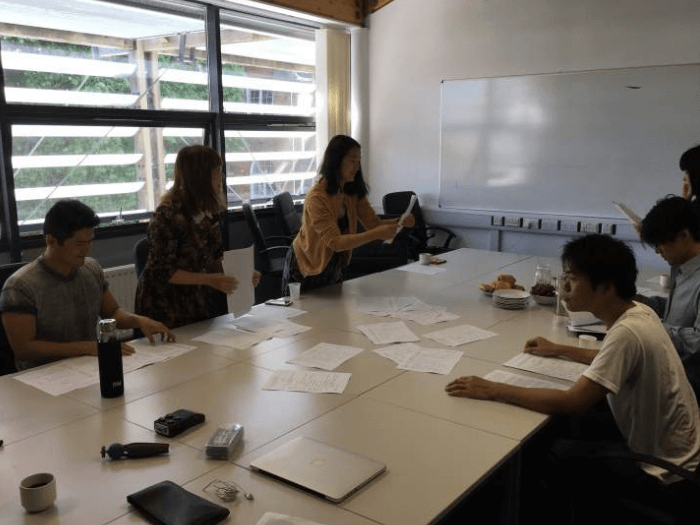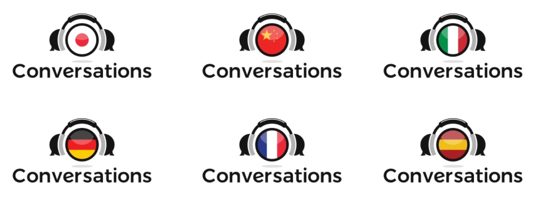
Accent is one of the most difficult skills to master as a language learner. Even if you can pronounce most words correctly in your target language, it's still not easy to sound natural or ‘native-like' when you speak. But there is something you can do to improve your accent … listen.
In this guest post from my polyglot friend Fiel Sahir, you'll find out how listening practice can help you with learning an accent in your target language.
Here’s what you’ll discover about how to learn an accent:
- Why you need to listen actively
- Why listening is a habit and what this means for practicing accents
- 6 simple steps you can take when listening to learn an accent
If you're looking for dedicated listening training in various languages, you should check out the Conversations programme.
Otherwise, I hope you enjoy the post!
Over to Fiel…
One of the joys of life is to trick people into thinking you’re a native speaker of another language, even if it’s just for five minutes.
It’s one of those things that if you achieve it, makes you feel like you've earned a degree. Sort of like getting that special sticker each day in kindergarten–it’s something to be proud of.
A very common question posed in language learning circles is this: Man, he/she’s got a flawless accent! How does he/she do it?
Maybe you’ve watched videos of online polyglots who are known for their native-like accents in multiple languages.
It’s the one thing everyone dreams about, but very, very few people really have. It’s really easy to walk away discouraged.
When someone’s been learning French for three months, while you’ve been learning it for three years, it’s really frustrating when they have a better accent than you! It’s tempting to dismiss it as talent and give up.
But here’s the secret: they used a superpower learned over time. One that you can learn too!
Can you learn an accent? Well, yes, accent learning isn't as hard as you think! It's possible to listen your way to a better accent!
Don’t believe me?
Remember how you learned as a baby?
Well actually, you probably don't. But here’s what happened:
You started off barely being able to pronounce words and spoke in your very own baby language. Meanwhile every day at home you were exposed to hours and hours of listening in your language.
Immersion at it’s finest.

Fast forward 5-10 years later. You learned to have a flawless accent in your native language, didn’t you?
Yep, you did.
How did that happen? Tons and tons of listening.
How To Improve Your Accent During Your Commute
As a high schooler, my commute was a daily total of two hours roundtrip. None of my friends lived in my neighbourhood, so my bus rides were always in solitude. But I did have one thing…
My iPod.
This was a time when iTalki was taking its first steps and Yahoo Answers was your best hope for language help. So you can imagine how scarce resources were compared to the present. I was learning French at the time, and I scoured– literally – scoured the internet for resources. I stumbled on FrenchPod and downloaded their lessons onto my MP3 player.
The lessons were real and entertaining. They gave you pizza but made sure you had your salad as well. Figuratively speaking…
Since I knew that I wouldn’t be traveling to France anytime soon, I began wondering, how could I travel to France without leaving my bedroom?
This led to hours spent watching French cinema, dubbed and or subtitled on my dreaded commute. I was a big fan of Asterix and Tintin, as any good French boy would be. It’s a pity nobody knows who they are in the US…
That’s Too Much Work. Passive Listening Is Better!
What if I told you that if you played classical guitar on the radio every day for a year, you could become a great musician.
You could sue me for being full of crap and you’d be right! OR You would give me a deathly stare and say, really now…?
The same thing goes for learning languages and how to get better at accents. If you could learn a language just by listening, the world would already be a better place wouldn’t it?
We often want the language facility of a grown educated adult and forget the hours of schooling, reading, and listening they went through to achieve that level of competence.
How Do I Listen Step By Step?
Language learners know that listening is really important, but they aren’t really taught how to do it.
Olly's StoryLearning courses are a big exception (you can try them for free here), because listening is baked right into the method.
But in case you're new to this, let me ask you something:
- Would you rather spend hours of your life and not see any improvement…
- Or a concentrated 15 minutes a few times a week with definite improvement?
Imagine yourself in a field full of butterflies. In your sheer excitement, you swing your net left and right missing butterflies constantly.
Your friend alongside you decides to focus on one at a time, and at the end of the outing has jars full of them. You can’t help but be jealous.
A net is only good if you know how to use it.
In order to achieve visible results, we must come ready with questions to focus our ears. So here are a few ideas to start mastering your language accent.
Rhythm & Flow

How fast or slow do native speakers speak? Where do they pause?
Feel the ups and downs as they speak.
Think of the speed of Spanish, the punching rhythm of German, or the melodic patterns of Brazilian Portuguese.
For example, stress placement in languages like English is essential. Think of words like photo and photography. Or present (as in gift) and present (as in perform).
Here are some more crazy examples:
- The bandage was wound around the wound
- I did not object to the object
- To help with planting, the farmer taught his sow to sow
- The dump was so full it had to refuse more refuse.
English is CRAZY!
Words can change meaning not only because of their letters but also because of how they're pronounced. And how you pronounce a word can tell people how “native” (or not) you sound. There will be phrases that make you sound like you have an accent, figure out what they are and work on perfecting them.
Tone

How do you feel when you listen to another language? Do the people speaking it “sound angrier” or “softer” than in your native language? What’s the feeling that listening to this language gives you?
Having an idea of how it feels to your ears will help you sound more and more like a native speaker.
Maybe speaking in one language or accent makes you feel or sound smart, while another one brings out a fiery personality you didn’t know you had.
Pay attention to these little details, because these things are what influence how you sound overall in that language.
Fillers & Liaisons
- How do natives cut off words or morph them?
- What words or phrases do they use that you don’t?
- What are typical filler words and where are they thrown in a sentence?
These are the million dollar questions to a better accent! Instead of asking, “How can I sound like a native speaker?” Instead ask, “How does Nadia speak?”
Imitate a certain person and observe. (How do you think actors get the job done?)
Notice as well that native speakers never speak fully like your textbook. EVER. In fact, a native speaker often has to really try to sound like that.
Even fancy professors in academia.
It’s also not enough to just know the words that are in the dictionary. You need to know what’s outside of it too!
Dictionaries will never catch up with the times! Blame musicians and the media for inventing new ways of speaking, but there you have it.
Pay attention to what native speakers add or drop whenever they’re speaking. In French, they often drop “ne” when negating.
- Ce n’est pas becomes C’pas ça mec! Mais bon… (That’s not it man, but ok, whatever)
In Spanish, whenever two vowels are together, one is dropped.
- No te apudes becomes No t’apudes chico (Don’t worry bro!)
In Indonesian, the letter ‘e' is often omitted after the letter ‘s' when spoken unless an emphasis is made:
- Selamat becomes Slamat pagi (good morning)
- Terima kasih becomes Trima kasih or even makasih (thank you)
Every language has its filler words. As much as one may not like them, they are essential to sounding like a native speaker.
Listening Is A Habit

We are what we repeatedly do. Excellence, then, is not an act, but a habit. – Will Durant
As great as all the ideas above are, they won’t amount to anything if you do them once and never again.
Reading this article will have been a complete waste of time.
Here’s the truth: listening is a habit and needs to be cultivated as such.
Let’s take a step back
Instead of thinking in terms of good accent or bad accent, let’s change things a bit. We often feel accents are simply some things we can never change. So let’s substitute accent with the word habit.
Each person’s mouth is shaped and has gone through the language equivalent of Olympic training in order to sound “native” in their own language.
No one was born automatically able to play the guitar or violin. It’s a cultivated habit.
You have to train your hand muscles to do something new, just like babies have to keep babbling in order to learn to pronounce words!
Habits are IMPORTANT.
Think of it this way: in order to learn a new habit, you have to get rid of the old one (or replace it.)
Same goes for how to learn a new accent!
Forget what’s natural to you because a new language calls for a new way of pronouncing things. Obviously, it’s not an on-and-off switch, but with practice, your “habit” will be stable enough that you can change without thinking.
How To Learn An Accent: 6 Top Rules
Even with the ideas above, a change of mindset is important so you can make outstanding progress with your accent:
1. Refuse To Tolerate Mistakes
I mean, absolutely refuse. What I often do is complain about how difficult grammar is and just hope that one day I’ll wake up with perfect sentences.
Mentally resolve you’re not going to let yourself keep making them. When you do, just catch yourself and remember that it’s a part of the process, but correct yourself as you go.
2. Exaggerate Your Vowels And Consonants
Intentionally trying to pronounce things differently will tell your brain that you’re trying to get rid of a habit! If not, your mouth will eventually slip back into the way it’s used to pronouncing words.
Just like how a person’s voice is only loud in a quiet setting as compared to when at a rock concert. Once you learn to over-enunciate, you’ll be able to adjust for how you’re supposed to sound.
3. Actively Want It
You’ve gotta want it. You can't just hope it into existence. I can’t practice for you and change your accent. Not much more to say on this front. Take some time to meditate on that.
4. Record Yourself To Hear Your Mistakes!
Many times, musicians practice in their room and come out feeling horrible, but when they play for peers, the result can often be unexpected. Same thing goes with accents, sometimes we actually think we sound worse than we are, or vice versa.
Listening to recordings of yourself allows you to get a real perspective on what you actually sound like to others.
There are tons of other techniques that musicians use to improve their playing that can be useful for you as a language learner. They aren’t all mentioned in this article, but in fact, Olly and I had a conversation addressing how musicians learn languages and the secrets we use, which you can watch below.
Alternatively, you can check out the audio version of the conversation on the StoryLearning Podcast.
These ideas will help you improve your language learning, guaranteed.
5. Learn Songs That Natives Listen To
Songs are one of the best ways to grab real vocabulary and practice forming your new habit and mouth shape.
Singers have to articulate individual sounds (phonemes) very clearly to make themselves understood, so songs are an excellent resource for pronunciation. The effort involved in memorising lyrics in a foreign language and the mental processing involved in associating words with melodies means that you will pay very close attention to the sounds of the words.
In the process, your pronunciation will improve quickly. You'll also learn a lot of new vocabulary in the process. If there's karaoke culture in your target language then you've got a great incentive (and potentially a lot of embarrassing nights ahead of you)!
6. Fight For Feedback And Use It

Correcting people isn’t an activity people enjoy, but asking natives to gently point out your mistakes will show you things you never realized. Sure, native speakers can’t always explain grammar, but they can instinctively tell you how something is said and if there’s anything “foreign” in your vocabulary.
Mass Exposure To Spoken Language
Story time. An 8 year-old Japanese girl called Natsuko, recently moved to the UK, once came to take guitar lessons with me.
She spoke no English whatsoever, but, as you would expect from a kid of that age, after one year of living in North London and attending school she spoke excellent English with a nice rounded British accent! It was an amazing transformation to watch.
Knowing no English at the beginning, she hardly spoke. And if you can't speak, there's nothing for it but to listen. How much time do you imagine she would have spent listening to English during that year at school?
Assuming 6-hour school days, a smattering of after-school activities and 6 weeks of school holidays, I estimate about 1,500 hours.
Are you, as a language learner, as effective as an 8-year-old child in picking up an accent? Sorry to say, but it's unlikely.
Long-term studies of immigrants to North America have shown that accent is the one element of language that is not only learnt more effectively by children, but is usually not learnt successfully by adults.
Now, if it took Natsuko 1,500 hours of intense listening at school, supported by teachers and classmates who would mediate their speech to help her understand… how many hours would you need? Let's be very generous and go for 2,000, give or take.
Where Am I At?
How many hours have you actually spent, in practice, listening actively to the language you're learning? (Authentic language spoken by native speakers in context – not “Teach Yourself” audio CDs!)
Whatever the gap in hours is, this is what you need to work on.
It took Natsuko one year. How long would it take you to get 2,000 hours of listening in?
15 mins per day: 21.9 years 30 mins per day: 10.95 years 45 mins per day: 7.3 years 60 mins per day: 5.48 years 90 mins (the length of a movie) per day: 3.65 years
Better get started!
Now, none of this is to say that you need 2,000 hours of listening in order to be understood. Nor is it to say that you need to have a native-speaker accent. You certainly don't.
However, if you are looking to improve your accent, or have ambitions in that direction, you need to start by knowing what you're aiming for – and that means a lot of listening.
What to listen to? Prioritise authentic sources: radio programmes, tv shows, movies. In order to get your hours in, it will help to find portable sources: podcasts produced in the target language (not language learning podcasts), audio books – put it all on your iPhone, ready to fire up during your commute.
Pair Listening With Conversations
There are so many factors that go into molding your mouth to produce a better accent. We’ve discussed what we should listen for and how we should listen. From tone to rhythm, passive versus active listening, it’s a lot to take in if you want to stop talking with an accent that doesn't sound native.
But rather than being overwhelmed, think about the one thing you can do to get started, say recording yourself. Spend just 15 minutes a day recording yourself and analyzing the results afterward.
Developing a great accent is one of the most difficult aspects of language learning. But, it’s possible! You just need a strong growth mindset.
Many language learners from around the globe draw from multiple resources to mold and produce a great accent.
What if there were a resource out there that helped address all of these needs in one place?
There's nothing better than real conversations.
Olly realised conversation is what makes the world go round and is something that language learners are lacking.
While learning Cantonese, he was frustrated with the lack of resources he could learn from. So he decided to create his own resources that featured real Cantonese conversations.
Rather than have people eternally looking for good conversational material, he decided he wanted to share this idea with the world and created conversations for six other languages as well (Chinese, French, German, Italian, Japanese and Spanish). You can check them out here.
All the ideas in this post go hand in hand with Conversations. By combining the new high-quality listening material Olly has created with the tips I've shared here you'll be on the path to having a great accent in no time.
Until then, remember the key for how to learn an accent – keep listening!
About the author:

A breaker of every stereotype one can give (except that he loves rice and wears glasses), Indonesian-American Fiel Sahir is the author of Between3worlds.com hailing from New York City.
He passionately teaches empathy through cultural exploration and conversation. A classical guitarist by trade, he is currently pursuing a Master’s degree in Classical Guitar performance in Düsseldorf, Germany.
He is also the Director of Int’l Outreach and Partnerships for Polyglot Indonesia. You can contact him directly via fiel [at] between3worlds.com and get a conversation started.
Do you want to improve your accent or listening skills? Which of the tips from this post will you use to help you do it? Let us know in the comments!

Olly Richards
Creator of the StoryLearning® Method
Olly Richards is a renowned polyglot and language learning expert with over 15 years of experience teaching millions through his innovative StoryLearning® method. He is the creator of StoryLearning, one of the world's largest language learning blogs with 500,000+ monthly readers.
Olly has authored 30+ language learning books and courses, including the bestselling "Short Stories" series published by Teach Yourself.
When not developing new teaching methods, Richards practices what he preaches—he speaks 8 languages fluently and continues learning new ones through his own methodology.










































